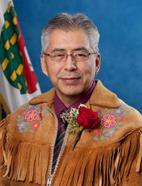Thank you, Mr. Chair. My view of the legislation is that it has almost taken the form of provincial light powers and authority of lands and waters, and the jurisdiction, of course, of within the Canadian federation, but I also understand, you know, the region that I come from called the Deh Cho, have not ceded, surrendered, and extinguished, or asserted Aboriginal title, and there are still ongoing negotiations. Those treaties were bilateral in nature between First Nations and the Government of Canada or Canada back in 1921, and so that was a bilateral process from what I understand, and so a lot of the current, our land claims, are trilateral in nature, where you have First Nations, governments, and the GNWT.
My understanding is that a lot of the treaty and Aboriginal rights that haven't been resolved, that are outstanding, that are not settled yet, their rights are entrenched in the Canadian Constitution, and with the same perspective from land claim groups. Their rights are entrenched in the Canadian Constitution. You know, those rights that we talk about, lands and waters or lands, First Nations, are paramount in a lot of respects to the initiatives that we are seeing through at this point. A lot of them, those initiatives were born from First Nations initiating discussions in terms of trying to reach certainty on the ownership and jurisdiction and their sovereignty of their lands and waters.
You know, what has been proposed as an amendment is giving a level of certainty. Yes, we need to be assured that there will be, if a candidate area has been proposed, governments will respond in a given time. You know, it is not going to get lost in the shuffle. That proposal is not going to sit in somebody's closet, or somebody's desk, I should say, and collect dust, but it is going to be acted upon, and that First Nations governments will be involved.
My understanding is that a lot of efforts have been made between Indigenous governments or Aboriginal governments, and with the current department, ENR, advancing this whole legislation towards that today, and of course, committee doing their due diligence, and so I think I would probably more likely gain favour of the amendment that it gives certainty. Because we all seek certainty, and it has to be explicit in terms of how we work with First Nations.
For a long time, treaties and agreements that sometimes were brokered between governments and First Nations were well-intended, but sometimes those are verbal understandings. We understand, we have known for a long time that it remains contentious in terms of how it could be interpreted, so if it is written down explicitly, then the more clarity of the legislation.
I will stand in favour of the amendment.
